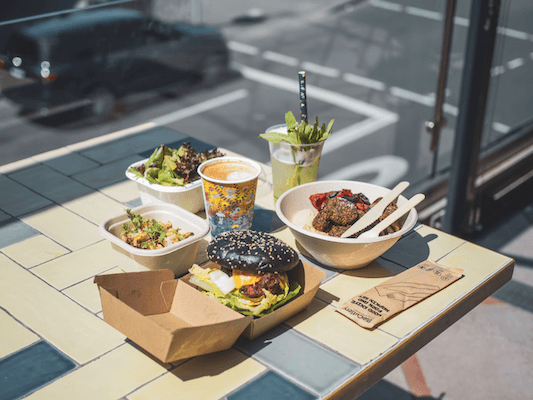The world is recognising the importance of sustainable practices, and eco-friendly packaging alternatives are at the forefront of this movement. Compostable packaging offers an attractive, environmentally conscious alternative to traditional plastic, providing significant benefits for the environment.
Today we share insights into compostable packaging, from ancient practices to modern innovations.
Ancient Compostable Packaging
Long before the advent of plastic, ancient civilisations used natural materials for packaging. These materials were inherently compostable, breaking down naturally without harming the environment.
The Egyptians used woven reeds and papyrus for wrapping and storing goods and the Romans used clay amphorae, which were biodegradable and could return to the earth without causing pollution. In Asia, leaves from banana and bamboo plants were commonly used to wrap food.
All of these are sustainable packaging practices.
Modern Compostable Packaging
Modern compostable packaging saw significant development in the late 20th and early 21st centuries.
The invention of polylactic acid (PLA) in the 1930s laid the groundwork, but it was only in the 1990s that PLA became commercially produced for packaging.
The market push for more sustainable solutions has led to the development of a wide range of compostable packaging options, including bags, containers and cutlery.
Earth-Friendly Countries
Several countries are leading the charge in adopting compostable packaging.
The European Union has been a pioneer, with countries like Germany and France implementing strict regulations to reduce plastic waste and promote compostable alternatives.
North America, Canada and the United States have also seen significant growth in the use of compostable packaging, driven by both consumer demand and regulatory changes.
Asia is following suit, with countries like Japan and South Korea making strides in sustainable packaging solutions.
The Australian Market
Australia has seen impressive growth in the compostable packaging market over the last decade.
According to a report by the Australian Packaging Covenant Organisation (APCO), the AU market for compostable packaging has grown by over 20% annually since 2013, with the 2022 market value sitting at approximately AUD 300 million.
This growth is driven by increasing consumer awareness, government policies and the efforts of companies like Planet Friendly Packaging.
Customising Green Packaging
Compostable packaging is not only eco-friendly but also highly customisable.
Simple customisations can include printing logos or designs using soy-based inks, which are also compostable.
More complex customisations involve creating bespoke shapes and sizes to meet specific product needs. Advanced techniques allow for the incorporation of barriers to protect against moisture and oxygen, ensuring the packaging meets the same functional standards as traditional plastic.
Compostable Packaging Benefits
There is a huge range of compostable packaging benefits.
This packaging alternative reduces reliance on fossil fuels, as many compostable materials are made from renewable resources like cornflour or sugarcane.
Landfill waste sites are alleviated as compostable packaging breaks down into nutrient-rich compost.
Compostable packaging helps lower greenhouse gas emissions associated with plastic production and disposal.
Businesses that actively make use of ecofriendly packaging can expect an enhanced brand image, as consumers increasingly prefer companies that prioritise sustainability.
Next Steps
Compostable packaging represents a crucial step towards a more sustainable future. From its ancient roots to modern innovations, it offers a practical solution to reducing environmental impact.
As countries and companies worldwide continue to adopt and innovate in compostable packaging, the benefits for the planet will only grow. Australia's burgeoning market is a testament to the potential of compostable packaging to drive positive change.
Empower your customers, empower the planet! Order compostable packaging for your business and be the change our planet needs today.





